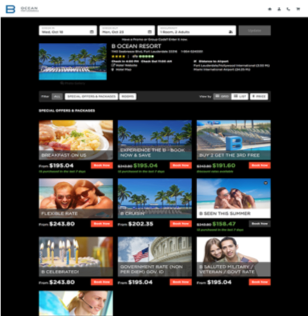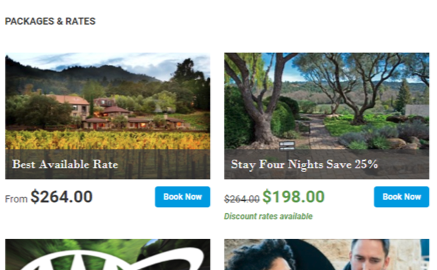Contributed by Paula Perrin, Sr. Market Analyst, SHR

Competition is nothing new to hoteliers. More and more hotel companies have emerged, markets continue to grow up, and channels keep expanding. In an OTA-centric world, the push for direct bookings has taken on a new fervor. And the newest kid in town, Airbnb, has added to the struggle, with approximately 4.5 million homes for rent in more than 81,000 cities around the world.Though the sharing-economy giant has gained considerable ground in recent years, some hoteliers still choose to see Airbnb as foreign or as an annoyance. OTAs were once regarded in the same way, and we all know how that turned out. Today’s sharing economy is a real thing, due in no small part to the unprecedented growth among Millennial travelers. We might also say it’s due to every person’s need to feel special and cared for when they travel. Arguably, Airbnb has made an art out of feeding this need, recently expanding its “experiences,” to 1,000 more cities. But what exactly is the effect of their presence, and can it be quantified and better understood?
Apparently, it can. An interesting new study released just this year, The Welfare Effects of Peer Entry in the Accommodation Market: The Case of Airbnb, outlines in detail the effects of the company on the hospitality industry, focusing on several major U.S. cities. The authors of the study, Chiara Farronato and Andrey Fradkin, provide some sobering metrics, none more so than this. In the ten U.S. cities with the largest Airbnb market share, hotel variable profits were reduced by up to 3.7 percent, and that’s only through 2014. So, what can you do today to utilize the so-called Airbnb effect in your favor? Utilize technology to empower you to do what you do best—provide the unique experiences that only a true hotelier can. You may not beat Airbnb at its own game, but you can definitely portray to your guest that you are meeting them where they are.
What Makes You Unique?

Playing up what makes you special is essential to engage potential guests. This goes beyond just keeping up with Airbnb, again, due to the sharing economy. Guest overnight accommodation choices are expanding, and the increase in limited-service properties is creating more unique competition for today’s hotels. Because of this, you need to ensure that your property and room type options fit into your larger market. Also, check to see how your property compares with various competitor occupancy levels or bedding options. Finally, beyond the traditional competitive sets with similar properties, you need to make sure that your hotel can dip into other areas to shift the guest share back toward you.
It's All About Personalization
What do your guests really want? Having the right features in your booking software can make all the difference when it comes to personalizing guest offerings. One popular feature is Add-Ons. These are an easy way to boost revenue and improve your guests’ experience at the same time. Don’t overthink them, because they can consist of virtually any hotel-sponsored products, i.e. shuttles, bicycle rentals, special room prep, foods, wines, etc. Utilize a feature like Persuasive Messaging, which shows strike-through pricing and immediate savings on-screen. Allow personalized offerings for each guest group, including tours, weddings, and conferences. And then tailor those experiences by room or rate so they are filtered in a relevant manner.
Persuading Them to Stay—and Book
Let’s look at the issue of a guest simply finding an attractive rate. It is within the sweet spot of room/rate/date that hoteliers and revenue managers price and forecast. These components can also create some side-effects as they hide true availability for a property. By using a booking engine geared to the technique of blended rates, you can begin filling the gaps between rates with a master rate. This way, guests can continue to book on their preferred stay dates, with blending done behind the scenes, invisible and seamless to the guest. Once you’ve responded with availability offerings, it allows you to list top upgrades for each booked room, and engage in gentle up-selling, making booking more costly rooms less stressful for guests (and more appealing) by taking it in smaller steps.
Offerings that Matter

Imagine that you have multiple offers for your guests as they search. You might have an advanced purchase rate where they get a different percentage off. And maybe also a discounted rate based on length of stay. While these are good ideas, placing the burden on the guest might tempt them to wander over to the Airbnb site because they think they might feel more understood. Leverage technology by showing them content relevant to them curated from their own information.
Curating rates, the practice of sorting and presenting only the most relevant booking content to your guests, removes the search burden. It loops through all those lists of information, sorting out, and sharing with your guests only those choices most relevant to them.
Putting the "Share" in Sharing
People are more likely to book when they see their choice validated by others, a phenomenon also known as crowdvoting. This is not surprising, considering that today, reviews have taken on the tone and importance to many people of a trusted friend, or even a relative. It’s also a fact that people do not post about their booking experience, they post about their hotel experience. Therefore, you want to make your guests’ job as easy as possible, and reassure them that they are making the right choice to book with you by linking a well-respected review site like the newer Oyster, or of course, the ever-trusty TripAdvisor directly into your website.
But reviews are never a set-it-and-forget-it proposition. As they say, good news travels, but bad news travels faster. You must evaluate your reviews to draw out what is actually happening during your guests’ stay and what is happening online after the stay, then address it. Becoming and remaining actively involved in the review loop will also allow you to inform guests of upcoming promotions, add-ons, and upgrades that you know they will love.
The Bottom Line?
The hotel experience has always been about sharing. With our technological means to share like never before, hotels need the most effective techniques available to start attracting—and converting—more guests with offerings unique to them. Because if you can make a traveler feel special in ways that are most relevant to them, you have a better chance of transforming searchers into loyal guests. This will help you build your brand as they build and share their life experiences through you.
P.S. Can we send you an email?
Once a week or so we'll send you our content updates. We never bug you; we just want to share our latest content.


